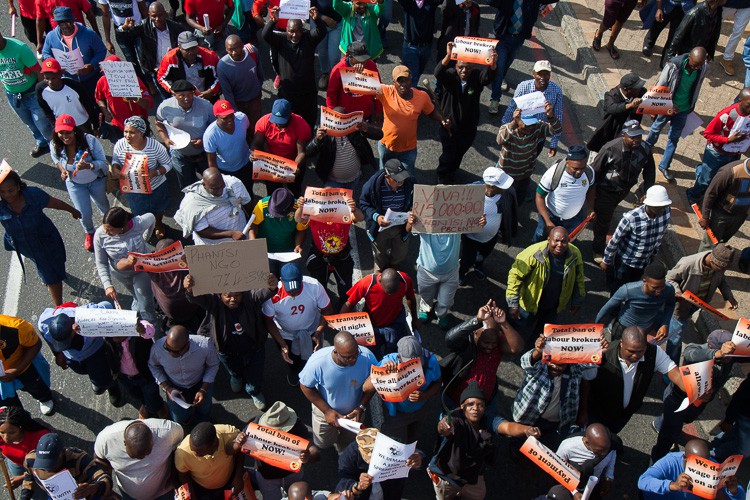
Over 150 striking workers march down Klipfontein Road in Cape Town to demand better wages and working conditions. Photo: Ashraf Hendricks
12 April 2017
Over 150 bus service employees marched this morning from the Athlone Civic Centre to the South African Road Passenger Bargaining Council (SARPBAC) in Rondebosch. This was the first day of the indefinite strike against their employers. Bus services across the country have stopped until further notice.
The march included employees from Golden Arrow, MyCiTi, Autopax, and Greyhound. Unions represented included SATAWU, NUMSA, and TAWU.
Strikers are demanding a wage increase and better working conditions, including medical aid, more employee control of scheduling overtime shifts, adherence to the Bargaining Council Agreement on overtime payment, and new spread over hours (spread over is “where a driver reports for work for a three-hour morning shift, breaks for eight hours and then works a further five hours” according to the SATAWU press release). The strikers want 12 hours a day for spread over, while employers want 14 hours a day.
“When I started with the company I earned R478 per week and my current salary is R2,938 [per week],” said Khasief Collins, General Secretary of SATAWU, who has been a Golden Arrow bus driver for 19 years.
“In negotiations we dropped to 15% and currently we’re standing on 12%,” Collins said of the wage increases. “The latest offer yesterday morning from the company was 9% and 1.5% for overtime.”
“As employers, we remain committed to the trade unions,” Meko Nadiea, spokesperson for the SA Bus Employers Association and Commuter Bus Employers Organisation, told GroundUp on Monday afternoon. “Labour has decided to go on strike before we could confer with them.” He said that a wage increase greater than 7.5% is improbable: “It’s unreasonable and we cannot afford it.”
Likhona Cita, Western Cape Passenger Sector Coordinator of NUMSA and one of the march organisers, said NUMSA’s biggest concern was improving labour conditions. “Our focus right now is the working conditions that the bus drivers and the bus sector at large are subjected to. When looking at the main collective agreement of the bus industry, it very much disadvantages its employees,” Cita said. “Not only are we interested in the actual increment percentage, but we are also interested in the Bargaining Council regulating the issue of adequate healthcare by providing medical aid.”
Currently, only Golden Arrow provides employees with medical coverage.
“We can’t make sense of it,” said Nadiea when GroundUp asked about workers’ demands for better conditions. “They have the best working conditions.”
Cita also said NUMSA was unsure how long the strike will last. “If the employer party comes to us and says, ‘NUMSA, we are willing to consider and concede to some of your demands,’ then it’s fine and we will end the strike,” Cita said.
“Striking has become our last resort,” said Elias Mjikwa, a driver at Golden Arrow for the past six years who is the NUMSA Chairperson of the Passenger Sector in the Western Cape and a national delegate in the wage negotiations.
Taxis are likely to be taking long-distance travellers on the Easter weekend who would otherwise have used buses. The chairperson of Parliament’s Portfolio Committee on Transport, Dikeledi Magadzi, said in a statement on Wednesday that the taxi industry would be “under a lot of pressure”.
“Hence drivers should exercise caution and at all times stick to the rules of no overloading and no speeding,” she said.